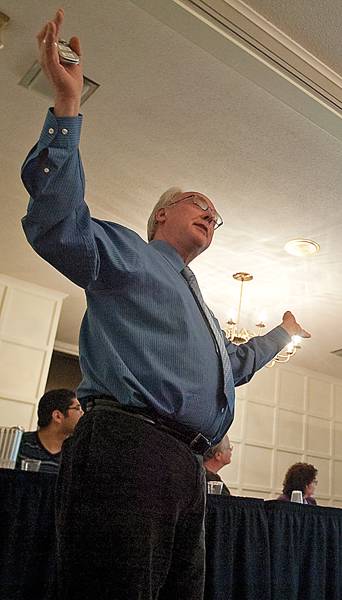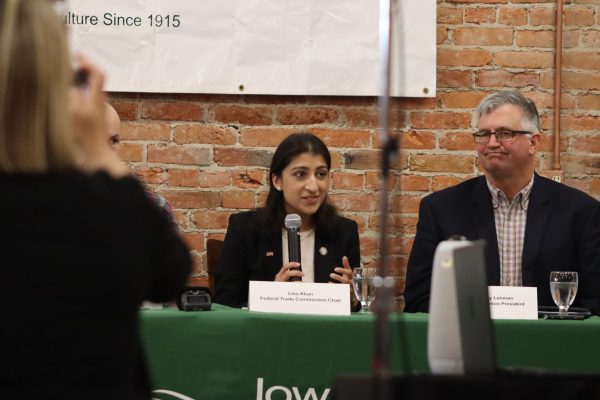Unifying religion, science

Dr. Clark Ford, professor in Food Science and Human Nutrition, proclaims “I came to embrace spirituality!” at the Darwin and Me lecture on Thursday in the Cardinal Room. Photo: Laurel Scott/Iowa State Daily
February 12, 2009
By Sarah Haas
Daily Staff Writer
Panelists from the ISU scientific community discussed how they reconcile their scientific work and religions during a celebration of Charles Darwin’s birthday.
In the Cardinal Room of the Memorial Union, approximately 100 people sat witness to personal testimonies from four faculty members and a graduate student who explained how they live harmoniously with scientific principles and their varying religions.
Ideas of Judaism, Christianity, Islam and a combination of spiritual philosophies and their relationships with science were exchanged.
Barbara Pleasants, adjunct assistant professor of ecology, evolution and organismal biology—Liberal Arts and Sciences, spoke of her philosophy that science does not detract from her religion, Judaism.
An anatomy instructor, she cited Theodosius Dobzhansky’s statement that, “Nothing in biology makes sense except in the light of evolution.”
However, Pleasants said the two entities of religion and science don’t have to be exclusive, and that her religion and its rich history of intellect and debate allow for a coexistence of ideas.
“In Judaism, the text is understood as a compilation of ancient fables, stories, oral tradition, some history. It doesn’t detract from its value … because the value of this text is how to behave and how to be a holy people,” Pleasants said.
In contrast, Thomas Ingebritsen, associate professor of genetics, development and cell biology—Liberal Arts and Sciences, said he sees evolution and nature as God’s creation, a way in which his Christian God reveals himself beyond his words in the Bible.
“Science does not have the competency to decide the existence or nonexistence of God. Science cannot prove or disprove God,” Ingebritsen said.
Instead, he looks to the natural world as proof that God exists because not all of its questions can be answered by science.
Michael Clough, associate professor of curriculum and instruction, however, said he views this pairing of science and religion as problematic.
“‘I believe in evolution’—that’s a strange phrase. … I don’t talk about belief in evolution. I talk about evidence that supports it,” Clough said.
Misconceptions of what science is and how it works permeate the public and educational spheres, Clough said.
“While it is a public education controversy, it is not a controversy within the scientific community,” he said.
The lack of training for science teachers to properly explain science as a separate entity from religion that does not require students to give up religious beliefs causes some of these misunderstandings.
Abdelhamid Azzaz, graduate assistant in biochemistry/biophysics and molecular biology—Liberal Arts and Sciences, said the teachings of Islam have always emphasized science, even in the religion’s holy text, the Quran.
He said a new understanding of the “creation stages” is being accepted by some in the Muslim community. Evolutionary creation is seen as an acceptable explanation because, as some Muslims believe, evolution occurred due to “the physical, chemical and biological rules that God set in the universe, as Allah is still the only creator of the universe and life.”
Like the views of other beginning to accept scientific theories, Clark Ford, associate professor of food science and human nutrition—agriculture and life sciences, explained how his relationship with science and religion evolved throughout his lifetime.
From a Presbyterian childhood to a brief stint with atheism, Ford resolved a disconnect between his profession and his background by finding a home in a spiritual belief.
“I respect myself, all humans and the rest of the natural world,” Ford.
He is a vegan who said he believes evolution and reincarnation work together as “agents of change and spiritual growth, in fact manifestations and world growth.”
The connection between religion and science is personal and varied, but the panelists said they can work together harmoniously.
“In one sense, I wonder why all the fuss about this. It’s a well-established science explanation. The evidence for it is overwhelming and yet people make such a big deal out of this. If Christ were here, if leaders of many religious persuasions were here, I think they would say how we got here is fairly insignificant compared to how we treat each other, how we act — most religions at their core are trying to deal with how we act, and if we concentrated exhibiting these qualities … not only the human condition would be better, but so would our standing with God,” Clough said.
















